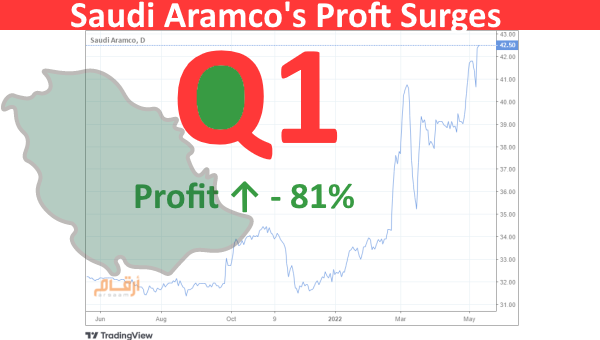Saudi Aramco, the state-owned oil company, reported a massive 81% increase in profit during the first quarter this year, thanks to the high oil prices.
It went past another milestone last week by dethroning Apple as the most valuable company in the world - for a brief period.
Despite the obvious sensitivity over the issue, when the whole world suffers from high crude oil prices, Saudis showed elation over the ; if criticism over pursuing profits at the expense of global economic growth as a whole gets intense, Saudis may defend the achievement by pointing to the losses that the oil giant suffered in the aftermath of the great oil price crash in April, 2020.
Saudi Arabia and the UAE have been under pressure by the main oil consuming nations in the world for months; the latter demand increased output something that the former resist, citing lack of investment in the sector as the main reason to elevate the output.
Of course, the Kingdom - along with the UAE - did not buckle under pressure, despite the displeasure of its main Western ally, the US; it knows what the West could lose if the relations that are already frosty get a turn for the worse; the importance of the lucrative defence contracts is a case in point.
Having repeatedly failed to make the Saudis change their position over the issue, the US is now raising the spectre of NOPEC legislation, that has, by coincidence, the connotation of 'no-to-opec'.
On Thursday last week, the US Senate Committee approved the decade-old NOPEC bill, passing a major milestone. The bill, indeed, overcame the first hurdle.
The NOPEC, No Oil Producing and Exporting Cartel bill - - was passed by the bipartisan Senate Judicial committee, overcoming one of the three hurdles; it has to be passed by the full Senate and then, approved by the president in order to become the law.
Understandably, the UAE and Saudi Arabia are publicly opposing the bill, warning it will do more harm than good. The supporters of the bill in the US - at present, no shortage of them in the country when the prices of oil and gas at record high levels - are in favour of state oil companies losing the shield of being sovereign institutions.
The fact that the bill was passed with 17/4 majority spells trouble for the key members of the OPEC+, given the probability being high for a potential success in the next two stages of the process.
If successful, the oil companies will be held accountable under anti-trust laws over what the US considers, 'the artificially engineered price hikes'.
Aramco, the Saudi owned oil company, will clearly be on the cross-hairs of the US authorities in the event of the bill becoming an act, followed by ADNOC, Abu Dhabi National Oil Company; in this context, it is understandable why the two Middle Eastern members of the OPEC+ are up in arms against the bill.
Since there are no signs of oil output going up, the demand may suffer in the short-run; the universal decline in economic growth and the widespread Covid-19 outbreaks in some parts of the world certainly make matters worse.
Analysts, in these circumstances, are eagerly awaiting the latest data on US crude oil stocks during the last week in order to gauge impact on the demand by evolving factors that determine them; there was a significant crude build last week.







